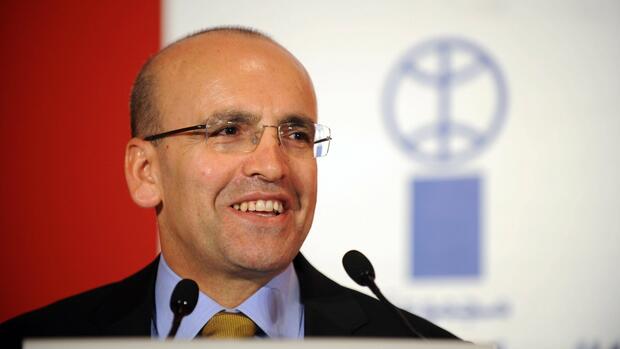Istanbul As soon as the new Turkish finance minister is in office, numerous indicators are moving in the right direction: Since the re-elected head of state Recep Tayyip Erdogan presented the economist Mehmet Simsek to the public at the weekend, the risk premiums for investments in Turkish stocks have increased by 200 basis points within hours dropped. The last time this value was this low was before the elections on May 14th.
The ISE100 stock market index rose five percent on Monday to a three-month high. Since May 28, when Erdogan prevailed against his challenger Kemal Kilicdaroglu in a runoff, the increase has even been 12.51 percent.
In recent years, Erdogan has fired several finance ministers and central bank governors in order to implement his economic and monetary policy. The president is a self-proclaimed enemy of interest rates and wants to boost the economy with cheap money. However, because the exchange rate of the lira falls as a result, imports become more expensive and fuel inflation. Inflation climbed to as much as 85.5 percent last fall. Inflation has cooled off somewhat recently, but was still almost 40 percent in May.
The new goal is clear: Mehmet Simsek, who was once Turkey’s finance minister and was replaced by Erdogan’s son-in-law in 2018, should save the domestic economy. “Transparency, consistency, predictability and compliance with international norms will be our basic principles to achieve this goal in the coming period,” he said recently. “Turkey has no choice but to return to a rational basis.”
But the “Simsek effect” does not yet work everywhere. The dollar and euro each rose by around one percent against the national currency, the lira, on Tuesday afternoon (local time). At 21.49 and 22.99 lira, they each marked a record high. Commerzbank analyst Ulrich Leuchtmann hopes that the turnaround will succeed. “But Simsek’s appointment alone cannot be reason to predict that. Not after the experience of the last few years.”
Major bank Goldman Sachs raised its three-month forecast from 19 to 23 liras and the six-month forecast from 21 to 25 liras per dollar. After twelve months, the exchange rate should even be 28 lira per US dollar. The rating agency Fitch also assumes that the country’s economic growth will more than halve to 2.6.
That has less to do with Simsek and much more to do with the monetary policy of his predecessors. The Turkish central bank had supported the lira with state reserves for months before the elections. The aim was to support the purchasing power of Turks before the elections in order to keep them happy.
After a five-year political hiatus, the new finance minister finds a country whose monetary and economic policies have been thrown into chaos. Apart from deals with the central banks of other countries, the reserves of the central bank have long since slipped into the red.
At the same time, Erdogan’s ultra-loose economic policies have unleashed activity that is second to none. Because despite the high inflation, many people in the country can afford more than before, thanks to strong wage increases and rising prices on the stock exchanges.
JP Morgan expects a sharp hike in interest rates
The minimum wage rose by almost 100 percent within a year, and the minimum pension even more. Companies also adjust the salaries of their employees several times a year. The index fund MSCI Turkey rose by 91 percent in 2022, calculated in euros. Five years ago, anyone who wanted to buy an Apple Macbook in Turkey had to save the equivalent of seven minimum wages. Today, 2.5 minimum wages are enough.
The people in the country are used to the fact that salaries continue to rise with prices – and that consumption never slows down. This is where the challenges for Simsek begin. Experts from JP Morgan expect that the new finance minister will raise the key interest rate sharply to up to 25 percent by June 22 at the latest, when the monetary policy council of the Turkish central bank next meets. It is currently 8.5 percent.
The economic cooling is necessary though. In particular, the large number of cheap loans, which were mainly issued by state banks, triggered unrestrained purchasing power in households, but also in companies and the state itself. The result: Most of the credit money was spent on products and services from abroad.
The country’s trade deficit rose to a record high. Because at the same time energy prices had risen worldwide in the past year, inflation for almost all goods in the country rose rapidly. Since then, butter in Turkey has been more expensive than in Germany, and cars cost more than twice as much.
>> Read here: Why Erdogan’s re-election can save European asylum policy
A reduction in demand would dampen inflation and stabilize prices. But this also increases the risk that companies will cut jobs. At around ten percent, unemployment is not particularly high for an emerging country. But rising numbers could become a problem for Erdogan, who is already talking about the next election campaign: local elections will take place at the end of March 2024.
While Simsek’s appointment could avert a financial and economic crisis in the short term, it’s unlikely to pave the way for a complete reversal in economic and monetary policy, suggests Wolfango Piccoli of consultancy Teneo. “Instead of abandoning ‘Erdonomics’, Turkey’s new economic team will try to gradually adapt it.”
The closer the local elections get, the narrower Simsek’s room for maneuver would be. “The political headwind is increasing.” Piccoli sees a risk emerging: that Simsek could gradually lose its luster after an initial phase in which he actually held power. He could make many promises – but deliver few results.
More: Turkish state-owned companies are raising prices by up to 40 percent

